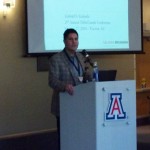Galanda Broadman has deepened its bench by adding two lawyers experienced in advancing the interests of powerful tribal governments.
Scott Wheat, an enrolled member of the Choctaw Nation and the current general counsel for the Spokane Tribe of Indians, joins the firm as Of Counsel.
Joe Sexton also joins the firm as Of Counsel after serving as an associate in-house counsel for the Yakama Nation.
“We’re thrilled to add Scott and Joe to our squad,” said Gabe Galanda, the firm’s managing partner. “Not only are both of these guys excellent tribal lawyers, but they have the high ethics and character necessary to do first-rate legal work in Indian Country.”

Scott has worked for tribal governments for over a decade. He has extensive litigation experience in tribal, state and federal courts, having litigated controversies involving gaming, taxation, Treaty fishing rights, natural resource protection, land use, federal recognition, and ancient land claims.
Joe practice focuses on complex land and environmental issues, multi-party litigation involving tribal sovereignty issues, torts and contract disputes. At Yakama, he assisted with fish habitat restoration work, the protection of archaeological and cultural resources, and the establishment of a tribal motor vehicle licensing program. Joe served in the United States Marine Corps and was deployed to Kuwait and Iraq in 2003.
Scott is a graduate of Seattle University School of Law (magna cum laude), and The Evergreen State College. Joe graduated from the University of Arizona College of Law, and The Citadel.
Galanda Broadman was recently named to the 2014 Edition of U.S. News – Best Lawyers “Best Law Firms,” in the arena of Native American Law. The firm, which styles itself “An Indian Country Law Firm,” is dedicated to advancing tribal legal rights and Indian business interests. With offices in Seattle, Washington and Bend, Oregon, the firm represents tribal governments, businesses and members in critical litigation, business and regulatory matters, especially in matters of Indian Treaty rights, tribal sovereignty and taxation.






 This year’s lineup of speakers include:
This year’s lineup of speakers include:






